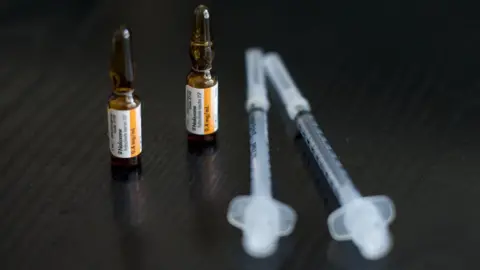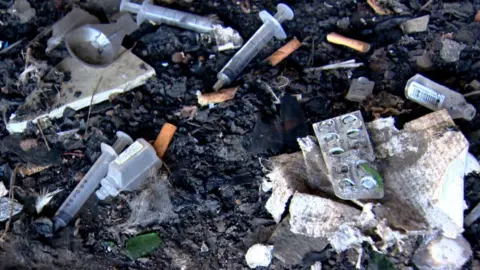Drugs tsar says addicts 'neglected and ignored'
Society is guilty of ignoring and neglecting addicts, the head of Scotland's drug deaths taskforce has said.
Prof Catriona Matheson was appointed to chair the taskforce last year after a record number of drug misuse deaths in Scotland acted as a "wake-up" call.
The much-delayed figures for 2019 are due to be published on Tuesday.
They are expected to be even higher than those for 2018, which showed 1,187 drug deaths - the highest in Europe.
The Scottish death rate per million of the population was more than three times the rate for England and Wales.
At the weekend, Scottish Lib Dem health spokesman Alex Cole-Hamilton said the latest figures were likely to be "horrifying".
Prof Matheson's taskforce began its work in September 2019 and was designed to gather evidence and provide solutions to the drugs emergency.
She said some good work had already been done but it would take a lot of effort and at least three years to stabilise the crisis.
More compassion
Prof Matheson told BBC Scotland everyone needed to help to tackle the problem.
"As a society we have been ignoring an under-served part of the population who we have really just neglected," she said.
"I think it is time we all woke up to that and got behind the effort to be a bit more humane, show a bit more compassion, because people are losing their loved ones unnecessarily.
"It is avoidable deaths and I think it is time that Scotland as a whole got behind the effort."
Prof Matheson said her taskforce had concentrated on three main areas: keeping people alive, reducing risk for drug users and removing stigma.
Keeping people alive
 Getty Images
Getty ImagesMuch of the work on emergency drug treatment has centred on the provision of naloxone, which reverses the effects of an opiate drug overdose if administered in time.
Last month, a pilot scheme began for police to carry naloxone and there is also work for the ambulance service to distribute take-home kits to people when they attend an overdose.
There is also a new scheme of "peer to peer" distribution of naloxone so its distribution can reach further into the community.
Reducing the risks
 Glasgow City Council
Glasgow City CouncilProf Matheson said that getting more people into treatment was also important in reducing drug deaths.
She said it was estimated that only about 40% of people who needed drug misuse treatment were getting it.
"If people think the services aren't adequate or aren't meeting their needs, they are not going to go," she said.
"If they have to wait a long time and go through lots of hoops, and checks and reassessments, it puts them off going."
The drugs taskforce is implementing a new set of standards for treatment to try to ensure people can access services quickly and stay in them as long as they need.
Prof Matheson also said there needed to be more choices in addition to methadone.
"There are other options now that we really need to get to grips with," she said.

While there are no miracle cures anywhere in the world, Prof Matheson said Scotland had not been good at pushing options such as Buprenorphine, which is now available as an injection that gives a long-lasting effect.
It means users no longer need to visit chemists to pick up methadone prescriptions every day.
It is hoped this will allow patients to focus on improving their lives and overall health rather than managing their dependence.
Prof Matheson said there was also support for the heroin assisted treatment project in Glasgow, which gives drug addicts pharmaceutical grade heroin - diamorphine.
It is hoped the facility will help reduce street drug use, overdose deaths and the spread of HIV in the city.
Prof Matheson said the range of options for drug users had been too narrow but was now "branching out".
Stigma

Although it might not immediately seem like it has an impact on drug-related deaths, Prof Matheson said she was convinced stigma played a huge role and needed to be tackled.
"Stigma affects people because they don't want to go for treatment," she said.
"They don't want to go to their GP if they have health problems, they feel stigmatised if they have a criminal record and they are stigmatised about getting work.
"This is keeping people excluded from the help and the care they need."
Prof Matheson said, as a result, older drug users - who have a range of respiratory, cardiac, liver and kidney issues - were not seeking treatment and were physically more vulnerable to an overdose.
Why is Scotland worse than other places?
 Thinkstock
ThinkstockProf Matheson said Scotland had many areas where deprivation was entrenched and there had been shown to be a link between this and drug use.
Much of this was linked to trauma and mental health problems suffered by people in these areas.
In addition, many of Scotland's problems stem from an "interesting relationship" with drug use that developed in the 1980s when cheap heroin flooded into the country and took hold.
Over the years patterns of drug use have changed, with people now taking illegal benzodiazepines - street Valium - as well as opiates.
There is also a growing problem of younger users injecting cocaine.
"That quite risky pattern of using several substances at once seems to be a Scottish feature," Prof Matheson said.
According to the taskforce chair, Scotland's drug problem is a "mature" one in that it has been known about for many years.
However, she said the debate around what to do has not been as mature as the problem.
She said she hoped her taskforce would provide the "clarity" over what fits best for Scotland.
